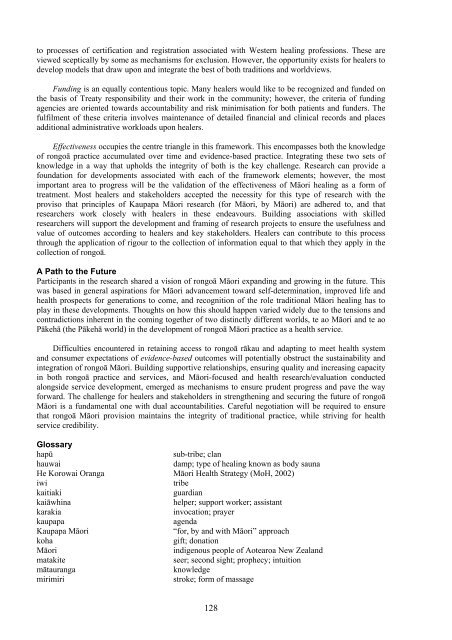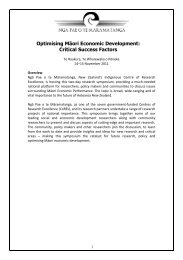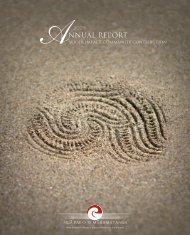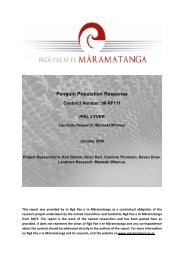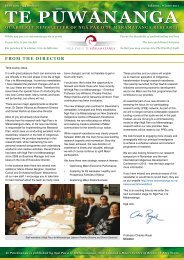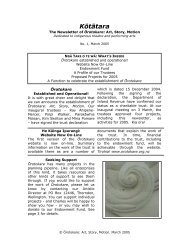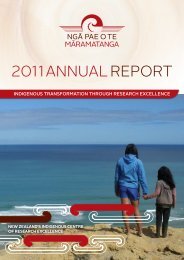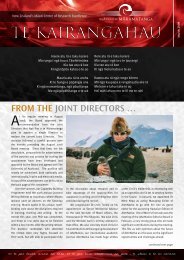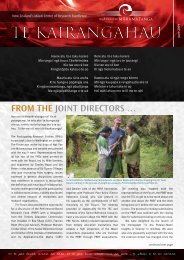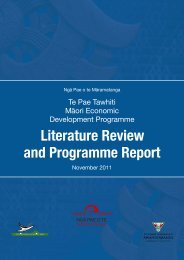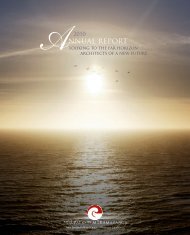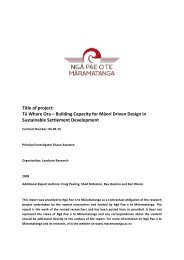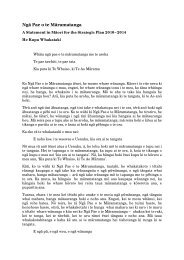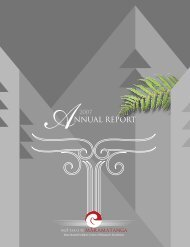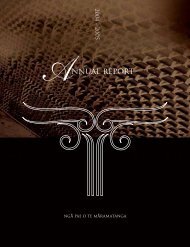traditional knowledge conference 2008 te tatau pounamu
traditional knowledge conference 2008 te tatau pounamu
traditional knowledge conference 2008 te tatau pounamu
Create successful ePaper yourself
Turn your PDF publications into a flip-book with our unique Google optimized e-Paper software.
to processes of certification and registration associa<strong>te</strong>d with Wes<strong>te</strong>rn healing professions. These areviewed sceptically by some as mechanisms for exclusion. However, the opportunity exists for healers todevelop models that draw upon and in<strong>te</strong>gra<strong>te</strong> the best of both traditions and worldviews.Funding is an equally con<strong>te</strong>ntious topic. Many healers would like to be recognized and funded onthe basis of Treaty responsibility and their work in the community; however, the cri<strong>te</strong>ria of fundingagencies are orien<strong>te</strong>d towards accountability and risk minimisation for both patients and funders. Thefulfilment of these cri<strong>te</strong>ria involves main<strong>te</strong>nance of detailed financial and clinical records and placesadditional administrative workloads upon healers.Effectiveness occupies the centre triangle in this framework. This encompasses both the <strong>knowledge</strong>of rongoā practice accumula<strong>te</strong>d over time and evidence-based practice. In<strong>te</strong>grating these two sets of<strong>knowledge</strong> in a way that upholds the in<strong>te</strong>grity of both is the key challenge. Research can provide afoundation for developments associa<strong>te</strong>d with each of the framework elements; however, the mostimportant area to progress will be the validation of the effectiveness of Māori healing as a form oftreatment. Most healers and stakeholders accep<strong>te</strong>d the necessity for this type of research with theproviso that principles of Kaupapa Māori research (for Māori, by Māori) are adhered to, and thatresearchers work closely with healers in these endeavours. Building associations with skilledresearchers will support the development and framing of research projects to ensure the usefulness andvalue of outcomes according to healers and key stakeholders. Healers can contribu<strong>te</strong> to this processthrough the application of rigour to the collection of information equal to that which they apply in thecollection of rongoā.A Path to the FutureParticipants in the research shared a vision of rongoā Māori expanding and growing in the future. Thiswas based in general aspirations for Māori advancement toward self-de<strong>te</strong>rmination, improved life andhealth prospects for generations to come, and recognition of the role <strong>traditional</strong> Māori healing has toplay in these developments. Thoughts on how this should happen varied widely due to the <strong>te</strong>nsions andcontradictions inherent in the coming together of two distinctly different worlds, <strong>te</strong> ao Māori and <strong>te</strong> aoPākehā (the Pākehā world) in the development of rongoā Māori practice as a health service.Difficulties encoun<strong>te</strong>red in retaining access to rongoā rākau and adapting to meet health sys<strong>te</strong>mand consumer expectations of evidence-based outcomes will po<strong>te</strong>ntially obstruct the sustainability andin<strong>te</strong>gration of rongoā Māori. Building supportive relationships, ensuring quality and increasing capacityin both rongoā practice and services, and Māori-focused and health research/evaluation conduc<strong>te</strong>dalongside service development, emerged as mechanisms to ensure prudent progress and pave the wayforward. The challenge for healers and stakeholders in strengthening and securing the future of rongoāMāori is a fundamental one with dual accountabilities. Careful negotiation will be required to ensurethat rongoā Māori provision maintains the in<strong>te</strong>grity of <strong>traditional</strong> practice, while striving for healthservice credibility.Glossaryhapūsub-tribe; clanhauwaidamp; type of healing known as body saunaHe Korowai Oranga Māori Health Stra<strong>te</strong>gy (MoH, 2002)iwitribekaitiakiguardiankaiāwhinahelper; support worker; assistantkarakiainvocation; prayerkaupapaagendaKaupapa Māori“for, by and with Māori” approachkohagift; donationMāoriindigenous people of Ao<strong>te</strong>aroa New Zealandmataki<strong>te</strong>seer; second sight; prophecy; intuitionmātauranga<strong>knowledge</strong>mirimiristroke; form of massage128


